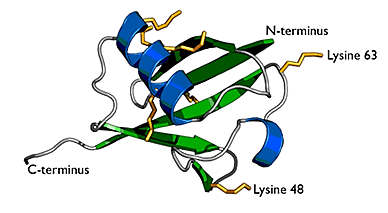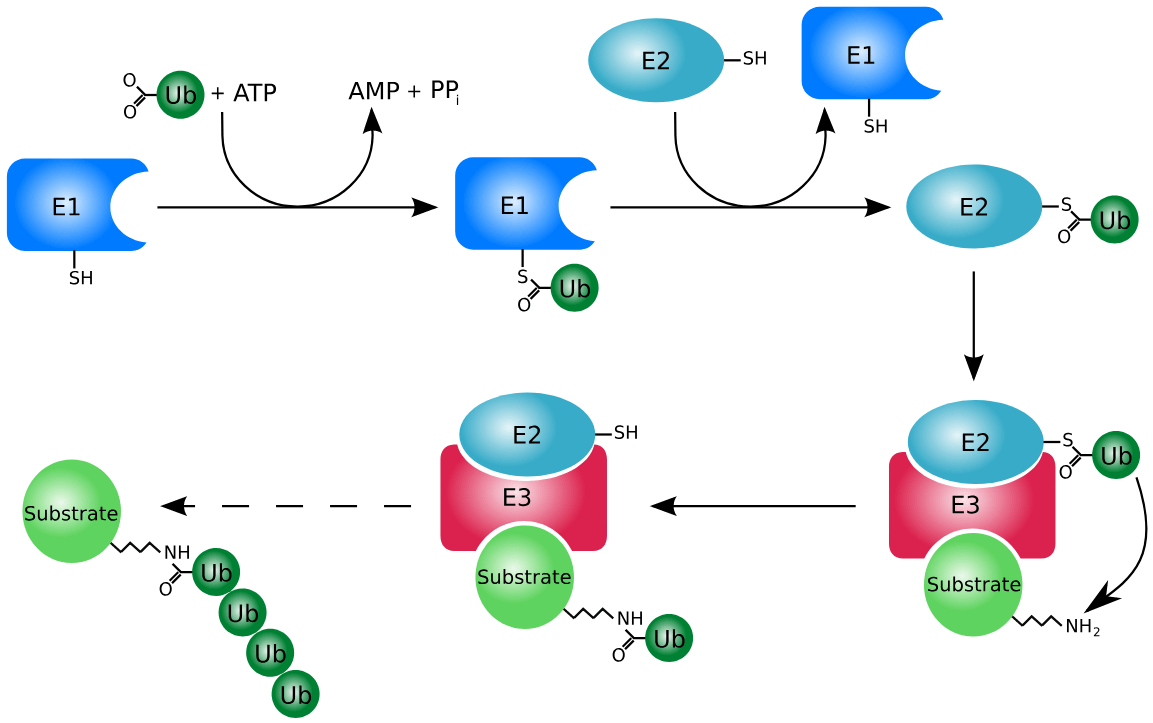Protein ubiquitination is an important post-translational modification process in eukaryotes. It regulates the stability, activity and degradation of proteins through the covalent binding of ubiquitin molecules to target proteins. Ubiquitination modification plays a key role in life activities such as cell cycle regulation, signal transduction, gene expression, and immune response. We provide comprehensive protein ubiquitination services to help customers conduct in-depth research on the ubiquitination mechanism of target proteins and solve the pain points in target screening, drug action verification and disease mechanism research.
What is Protein Ubiquitination?
Ubiquitin refers to the process in which ubiquitin molecules classify intracellular proteins under the action of a series of special enzymes, select target protein molecules, and modify target proteins specifically. Ubiquitin plays a very important role in protein localization, metabolism, function, regulation and degradation. At the same time, it is also involved in the regulation of cell cycle, proliferation, apoptosis, differentiation, transfer, gene expression, transcriptional regulation, signal transmission, injury repair, inflammation and immunity and so on. Therefore, as a major achievement of biochemical research in recent years, it has become a new target for the research and development of new drugs.

The Process of Protein Ubiquitination and Degradation

Protein Ubiquitination Services
Ubiquitination Analysis Services
Ubiquitination Level Detection: Using techniques such as Western Blot, ubiquitination levels are detected using ubiquitin antibodies or substrate-specific antibodies to assess the ubiquitination status of target and potential off-target proteins, confirming the E3-based drug action.
Ubiquitination Site Analysis: Utilizing liquid chromatography-high-resolution mass spectrometry (LC-HRMS), ubiquitination sites on proteins in cell samples are identified, determining the exact position of ubiquitination modifications, providing important information for studying protein function and regulatory mechanisms.
Ubiquitination Experimental Services
In Vitro Ubiquitination Experiment: Under in vitro conditions, the ubiquitination process is simulated by adding E1, E2, E3 enzymes and substrate proteins, observing and analyzing the ubiquitination of substrate proteins, and studying the mechanisms and regulatory factors of the ubiquitination reaction.
Intracellular Ubiquitination Experiment: At the cellular level, specific E3 ligase or substrate protein expression vectors are introduced into cells by transfection methods. Ubiquitination levels in the cells are detected using techniques such as immunoprecipitation and Western Blot, studying the ubiquitination modification and its function within the cell.
Ubiquitination Proteomics Analysis: Large-scale ubiquitination proteomics analysis of proteins in cells or tissue samples is conducted to identify and quantify ubiquitinated proteins, analyzing their changes under different physiological or pathological conditions, providing potential targets and biomarkers for disease mechanism research and drug development.
E3 Ligase-Related Services
E3 Ligase Activity Analysis: The catalytic activity of E3 ligases is tested to assess their function and efficiency in ubiquitination reactions, providing experimental evidence for studying the mechanism of E3 ligases and screening E3 ligase inhibitors or activators.
E3 Ligase-Substrate Protein Interaction Analysis: Using techniques such as pull-down and co-immunoprecipitation (Co-IP), the interaction between E3 ligases and substrate proteins is studied, determining the specificity recognition mechanism of E3 ligases for substrate proteins, offering important clues for uncovering the molecular basis of protein ubiquitination regulation.
Custom E3 Ligase Development Services: E3 ligases with specific functions or characteristics, such as high activity and high specificity, are developed based on customer needs to meet various research and application requirements.
PROTAC-Related Services
PROTAC Molecule Design and Synthesis: PROTAC molecules are designed and synthesized with high affinity and specificity based on the characteristics of the target protein and E3 ligase, aiming for efficient degradation of the target protein.
PROTAC In Vitro Evaluation Services: A comprehensive PROTAC in vitro analysis platform is established, including binary and ternary complex formation analysis, target ubiquitination analysis, and target degradation level analysis, to comprehensively evaluate the in vitro activity and efficacy of PROTAC molecules.
PROTAC In Vivo Pharmacology and Efficacy Studies: PROTAC molecules are studied in animal models for their in vivo pharmacological efficacy, including the degradation effect on target proteins, therapeutic effects on disease models, and the drug's toxicity and tolerance, providing important data support for preclinical research of PROTAC drugs.
Why Choose Our Services?
Strong Technical Capability: Equipped with advanced laboratory equipment and a professional technical team, skilled in utilizing techniques such as Western Blot and LC-HRMS to ensure the accuracy and reliability of ubiquitination analysis.
Professional Team: The team has extensive experience in protein ubiquitination research, covering fields such as biochemistry, molecular biology, and cell biology, providing comprehensive technical support and solutions.
Customized Services: Tailored service plans are provided based on customer-specific needs, including experimental design, technology selection, and data analysis to meet the requirements of various research projects.
Data Quality Assurance: Standardized experimental processes and quality control systems are strictly followed to ensure the accuracy and reproducibility of experimental data, offering strong support for customers' scientific research results.
Fast Delivery Cycle: Optimized experimental processes and efficient team collaboration enable quick completion of experiments and timely delivery of results, helping customers accelerate their research progress.
Workflow of Protein Ubiquitination Services
- Project Consultation and Needs Analysis: Customers contact us and provide research background and specific needs. Our technical experts will engage in in-depth discussions with customers to understand project goals and experimental requirements, and jointly determine an appropriate service plan.
- Project Launch and Contract Signing: After mutual agreement, a service contract is signed, detailing service content, delivery time, costs, etc., and the customer makes a prepayment, officially launching the project.
- Experimental Design and Plan Formulation: Based on customer needs and project goals, our technical team will develop a detailed experimental plan, including sample preparation, experimental methods, data analysis, etc., and confirm the feasibility of the plan with the customer.
- Experiment Execution and Data Collection: Experiments are conducted according to the plan, using advanced instruments to perform ubiquitination level detection, site analysis, and other experiments, ensuring the accuracy and reliability of data.
- Data Analysis and Result Interpretation: Professional analysis and interpretation of experimental data are performed, and a detailed experimental report is provided, including results, data analysis, and conclusions, to help customers understand the results and their implications for research.
- Result Delivery and After-Sales Service: Experimental results and reports are delivered to the customer. After customer acceptance, the final payment is made. We provide after-sales service to address any questions the customer may have during further research, and continuously optimize service quality based on customer feedback.
Frequently Asked Questions (FAQs)
1. Is detecting the autoubiquitination phenomenon of E3 ligases a necessary step?
It depends on the structure of the E3 ligase. For E3 ligases with a HECT domain, ubiquitin needs to be transferred to the ligase itself first, and then transferred to the substrate protein. Therefore, detecting its autoubiquitination is necessary. However, for E3 ligases with a Ring domain, ubiquitin is transferred directly from E2 to the substrate protein, and detecting the autoubiquitination of E3 is not as meaningful.
2. How can the relationship between E3 ligases and substrate proteins be determined?
The relationship can be explored using Pull-down + LC-MS techniques to identify the corresponding E3 ligase for a substrate protein. However, it is important to note that mass spectrometry data may not fully reflect the entire picture. Even if an E3 ligase is found in the mass spectrometry list, it could be a product of indirect interaction. Therefore, further verification of the interaction is required to draw conclusions.
3. How to obtain E3 proteins and substrate proteins?
These proteins can be obtained through recombinant expression. From a cost perspective, prokaryotic expression is recommended; from an activity perspective, it is advisable to refer to the species of the materials being studied and select an expression system with a closer evolutionary relationship to obtain the proteins.
4. After completing the ubiquitination experiment, how to detect the ubiquitination levels?
Ubiquitination levels can be detected by Western blot using ubiquitin antibodies or substrate-specific antibodies, or by mass spectrometry to analyze the specific forms of ubiquitin.
References:
- Bhogaraju, S., & Dikic, I. (2016). Cell biology: Ubiquitination without E1 and E2 enzymes. Nature, 533(7601), 43.
- Fulda, S., Dikic, I., & Heilemann, M. (2019). Visualizing ubiquitination in mammalian cells. EMBO reports.
* PROTAC® is a registered trademark of Arvinas Operations, Inc., and is used under license.



